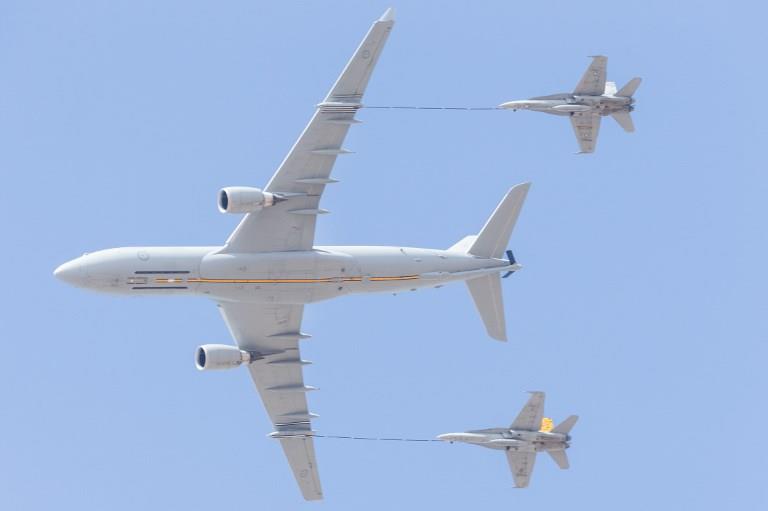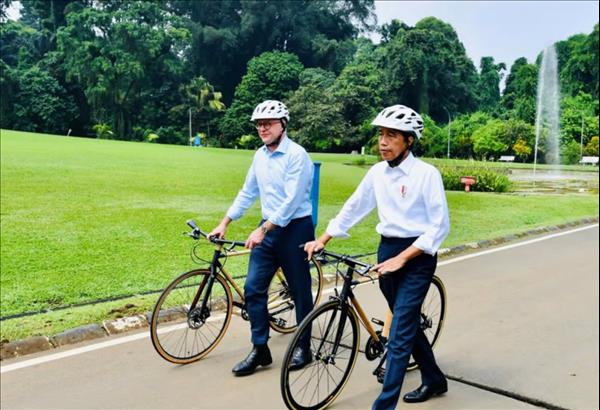
Australia, Indonesia Soft-Pedal Their China Problems
JAKARTA – Newly-installed Australian Prime Minister Anthony Albanese has wasted little time in visiting Indonesia, his arrival coinciding with two incidents in the South China Sea that ensured China's growing geopolitical ambitions remain high on the agendas of both countries.
But he and President Joko Widodo appear to have limited their conversation to broader security issues, focusing instead on trade and investment and Canberra's efforts to put more substance into the 2019 Indonesia-Australia Comprehensive Economic Partnership Agreement.
“It is important we recognize that Indonesia isn't just Jakarta and Bali,” Albanese said, underlining that view by taking a quick side-trip to the South Sulawesi capital of Makassar.“It is a vast archipelago, it is an important nation to our north, the largest Muslim nation on the planet.”
Riding together on bamboo bicycles around the spacious grounds of the Bogor presidential palace, Widodo and Albanese set the tone for what promises to be an easy-going relationship between men from equally humble backgrounds.
The two leaders discussed Australia's proposed US$200 million climate and infrastructure fund with Indonesia and also its more recent offer of assistance in the design and construction of Indonesia's planned new capital in East Kalimantan.
The infrastructure minister in the Julia Gillard and Kevin Rudd administrations, Albanese is obviously aware of how much stock Widodo places in the ambitious $33 billion project as potentially the crowning achievement of his two-term presidency.
Unlike predecessor Scott Morrison, Albanese will have also pleased the Indonesian president by promising to attend the G-20 Summit in Bali next November, apparently whether Russian President Vladimir Putin is there or not.
“I did so because the work of the G-20 is critical at this time of economic uncertainty,” he said, referring to the damaging global fallout from Russia's invasion of Ukraine.“I will work closely with President Widodo to help deliver a successful summit.”
Although official statements suggested the dialogue did touch on global and regional issues, the discussion was confined to generalities rather than anything specific, such as China.
“Australia and Indonesia have different foreign policies with different countries,” Albanese explained.“We have different histories. Australia has always had a strong pillar with the United States. Indonesia has been different. We respect that.”

New Australian Prime Minister Anthony Albanese and Foreign Minister Penny Wong have already moved to address China's rising influence in the Pacific. Image: Screengrab / ABC
Senior Australian Strategic Policy Institute (ASPI) analyst David Engel wasn't surprised on a different level.“The way to the president's heart is through development,” he said, pointing to the now-familiar transactional nature of Widodo's approach to foreign relationships.
It was only during the Labour prime minister's subsequent call on ASEAN secretary-general Lim Jock Hoi that he got to discuss Australia's commitment to Southeast Asia and, presumably, China's more assertive posture in the region.
The moment he took office, Albanese was confronted with a foreign policy challenge presented by Beijing's latest efforts, unsuccessful as they apparently turned out to be, to create a security arrangement with Fiji, Samoa and eight other Pacific island nations.
Covering everything from police training and cybersecurity to criminal forensics and fisheries, Beijing's move followed the signing of a security pact between China and the Solomon Islands last April which had Canberra scrambling to respond.
The Pacific nations have told the Chinese they are not interested in any agreement that might drag them into the center of big power rivalry and ignore the priority they place on the impact of climate change on their low-lying islands.
Adhering to its historic non-aligned status, Indonesia has similar concerns, worried that the broad-based AUKUS security agreement reached between Australia, Britain and the United States last October could spark an arms race in the region.
Jakarta has its own difficulties with China as it tries to balance threats along its northern maritime border with massive Chinese investments that are transforming the Indonesian economy in ways hitherto unseen.
Days before Albanese's visit, the Indonesian Navy corvette Imam Bonjol intercepted two Chinese Coast Guard (CCG) vessels inside the country's economic exclusion zone (EEZ) in the first known incident since a prolonged Chinese incursion last year.
Sources tracking their movements say the two vessels complied with a directive to leave the area, but Chinese and Indonesian officials had no comment on the encounter, which was only reported on the navy's Instagram account.

A China Coast Guard ship passes near an Indonesian warship in a July 2019 file photo. Photo: Indonesian Navy's Western Region Fleet Command
The latest incident took place close to where the survey ship Haiyang Dizhi and a pair of CCG escorts spent seven weeks last year mapping the seabed around a drilling operation being carried out by Harbour Energy in its natural gas concession.
The Tuna Block lies inside China's nine-dash line of claimed historical sovereignty, which intrudes unlawfully into Indonesia's EEZ and now appears to have become a point of contention over the natural resources it contains.
During an undisclosed diplomatic exchange at the time, China told the Indonesian government that it should stop drilling for oil and gas in what it said was“Chinese territory” – an indication it now intends to enforce the nine-dash line's southernmost reaches.
“It is always going to be active,” says one navy analyst, noting how the Hainan-based Southern Coast Guard Fleet maintains a permanent presence in the general area.“China continues to push the envelope and Indonesia continues to respond appropriately.”
One of the latest intruders was identified as the CCG 5303, which had its automatic identification system (AIS) switched on when it was intercepted. It was accompanied by a second vessel that was running dark, a familiar story for much of the CCG fleet.
On the eve of Albanese's arrival in Jakarta, the Australian government disclosed a dangerous May 26 mid-air incident between a Royal Australian Air Force (RAAF) P-8A Poseidon maritime patrol aircraft and a Chinese J-16 fighter in airspace between Vietnam's central coast and the contested Paracel Islands in the South China Sea.
Defense Minister Richard Marles said the J-16 flew close to the P-8 and released flares. Then it accelerated, cutting across the nose of the Australian plane before discharging a bundle of chaff, some of which was sucked into the P-8's engines.
Chaff is a cloud of small pieces of aluminum and metalized glass fiber or plastic, normally used as a radar counter-measure to swamp screens with multiple returns and distract radar-guided missiles.
Last February, Australia protested over an incident in which a Chinese guided-missile destroyer shone a“military-grade” laser beam at a RAAF P-8 in Northern Australia's strategic Torres Strait, endangering the eyesight of the plane's pilots.

A Royal Australian Air Force P-8A Poseidon refuels two F/A -18F Super Hornet jets in a file photo. Photo: Anadolu Agency via AFP
Marles called China's recent action a similarly dangerous maneuver and, speaking before his departure for Jakarta, Albanese said the government had made“appropriate representations” to Beijing.
Marles said surveillance operations in the South China Sea were within Australia's rights under international law.“This is a body of water which is deeply connected to Australia because of our trade,” he told journalists.
The P-8 is one of two aircraft currently staging out of Clark airbase in the Philippines under an arrangement with the Manila government signed last year. Apart from the South China Sea, they have conducted missions over the Philippine Sea and as far south as the Makassar Strait separating Kalimantan and Sulawesi.

Legal Disclaimer:
MENAFN provides the
information “as is” without warranty of any kind. We do not accept
any responsibility or liability for the accuracy, content, images,
videos, licenses, completeness, legality, or reliability of the information
contained in this article. If you have any complaints or copyright
issues related to this article, kindly contact the provider above.

















Comments
No comment